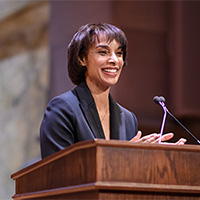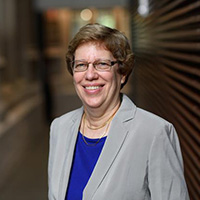Two faculty members of the Princeton School of Public and International Affairs have been elected to the prestigious National Academy of Sciences.

Cecilia Elena Rouse, the Lawrence and Shirley Katzman and Lewis and Anna Ernst Professor in the Economics of Education, and a professor of economics and public affairs, and Noreen J. Goldman, the Hughes-Rogers Professor of Demography and Public Affairs and a faculty associate at the Office of Population Research, are among the new NAS members announced today.
Rouse, a labor economist with a focus on the economics of education, is a former dean of Princeton SPIA. She is currently on leave from Princeton while serving as president of the Brookings Institution. Rouse is a former chair and member of the Council of Economic Advisors, a member of the American Philosophical Society and the National Academy of Education, and the founding director of the Princeton Education Research Section. She joined the Princeton faculty in 1992 after earning her Ph.D. in economics from Harvard University, where she also completed her undergraduate work.

Goldman, a specialist in demography and social epidemiology, researches the impact of social and economic factors on health and the physiological pathways through which these factors operate. She has been a visiting scholar at the Russell Sage Foundation, a fellow at the Center for Advanced Study in the Behavioral Sciences, and a visiting professor at UCLA and the University of Fribourg in Switzerland. Goldman joined the Princeton faculty in 1987. She holds a D.Sc., an M.Sc., and an M.A. from Harvard and a B.A. from New York University.
“On behalf of the entire School, I want to express how proud we are of Dr. Rouse and Dr. Goldman. They are first-class scholars whose work is both exemplary and deeply relevant. Congratulations to them on this most deserved recognition.”Princeton SPIA Dean Amaney Jamal
The National Academy of Sciences is a private, nonprofit institution that was established under a congressional charter signed by President Abraham Lincoln in 1863. It recognizes achievement in science by election to membership, and — with the National Academy of Engineering and the National Academy of Medicine — provides science, engineering, and health policy advice to the federal government and other organizations.


